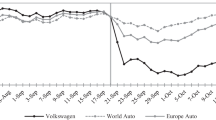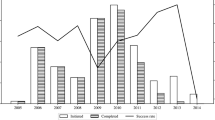Abstract
This paper studies a general equilibrium model with an investor-controlled firm. Shareholders can vote on the firm’s production plan in an assembly if they dislike management’s decision. Prior to that they may trade shares on the stock market. Since stock market trades determine the distribution of votes, trading is strategic. There is always an equilibrium, where share trading leads to an ownership structure that supports competitive behavior. But there may also be equilibria, where monopolistic behavior prevails.
Similar content being viewed by others
References
Aghion P., Bolton P.: An incomplete contracts approach to financial contracting. Rev Econ Stud 59, 473–494 (1992)
Arrow K.J.: A difficulty in the concept of social welfare. J Polit Econ 58, 328–346 (1950)
Arrow K.J.: Social Choice and Individual Values, 2nd edn. Wiley, New York (1963)
Bagnoli M., Lipman B.L.: Successful takeovers without exclusion. Rev Financ Stud 1, 89–110 (1988)
Bejan C.: The objective of a privately owned firm under monopolistic competition. Econ Theory 37, 99–118 (2008)
Bejan, C.: Production and financial decisions under uncertainty. University of Minnesota (2004) (unpublished)
Benninga S., Muller E.: Majority choice and the objective function of the firm under uncertainty. Bell J Econ 10, 670–682 (1979)
Burkart M., Gromb D., Panunzi F.: Why higher takeover premia protect minority shareholders. J Polit Econ 106, 172–204 (1998)
DeMarzo P.M.: Majority voting and corporate control: the rule of the dominant shareholder. Rev Econ Stud 60, 713–734 (1993)
Dierker E., Dierker H.: General equilibrium with imperfect competition. J Eur Econ Assoc 4, 436–445 (2006)
Dierker, E., Dierker, H.: Drèze Equilibria and Welfare Maxima. Econ Theory (2009). doi:10.1007/s00199-009-0476-7
Dierker E., Dierker H., Grodal B.: Nonexistence of constrained efficient equilibria when markets are incomplete. Econometrica 70, 1245–1251 (2002)
Dierker E., Dierker H., Grodal B.: Are incomplete markets able to achieve minimal efficiency?. Econ Theory 25, 75–87 (2005)
Dierker E., Grodal B.: Profit maximization mitigates competition. Econ Theory 7, 139–160 (1996)
Dierker E., Grodal B.: The price normalization problem in imperfect competition and the objective of the firm. Econ Theory 14, 257–284 (1999)
Dierker H., Grodal B.: Non-Existence of Cournot-Walras Equilibrium in a General Equilibrium Model with Two Oligopolists. In: Hildenbrand, W., Mas-Colell, A. (eds) Contributions to Mathematical Economics, North-Holland, New York (1986)
Dorofeenko V., Lang L.H.P., Ritzberger K., Shorish J.: Who controls allianz?—measuring the separation of dividend and control rights under cross-ownership among firms. Ann Finance 4, 75–103 (2008)
Drèze J.H.: Investment under private ownership: optimality, equilibrium, and stability. In: Drèze, J.H. (eds) Allocation under Uncertainty: Equilibrium and Optimality, pp. 129–166. Wiley, New York (1974)
Drèze J.H.: (Uncertainty and) the firm in general equilibrium theory. Econ J 95, 1–20 (1985)
Gabszewicz J.J., Vial J.-P.: Oligopoly à la Cournot” in a general equilibrium analysis. J Econ Theory 4, 381–400 (1972)
Grodal B.: Profit maximizing behavior in general equilibrium models with imperfect competition (in Danish). Econ Essays 28, 79–89 (1984)
Grodal, B.: Profit maximization and imperfect competition. In: Allen, B. (ed.) Economics in a changing world. Proceedings of the Tenth World Congress of the International Economic Association, Moscow, vol. 2., pp. 3-22. St. Martin’s Press, New York (1996)
Grossman S.J., Hart O.D.: A theory of competitive equilibrium in stock market economies. Econometrica 47, 293–329 (1979)
Grossman S.J., Hart O.D.: Takeover bids, the free-rider problem, and the theory of the corporation. Bell J Econ 11, 42–64 (1980)
Grossman S.J., Hart O.D.: One share-one vote and the market for corporate control. J Financ Econ 20, 175–202 (1988)
Haller H.: Market power, objectives of the firm, and objectives of shareholders. J Inst Theor Econ 142, 716–726 (1986)
Harris M., Raviv A.: Corporate governance: voting rights and majority rules. J Financ Econ 20, 203–235 (1988)
Hirshleifer D.A., Titman S.: Share tendering strategies and the success of hostile takeover bids. J Polit Econ 98, 295–324 (1990)
Holmström B., Tirole J.: Financial intermediation, loanable funds, and the real sector. Q J Econ 112, 663–691 (1997)
Jensen M.C., Meckling W.: Theory of the firm: managerial behavior, agency costs and ownership structure. J Financ Econ 3, 305–360 (1976)
Kelsey D., Milne F.: Imperfect competition and corporate governance. J Public Econ Theory 10, 1115–1141 (2008)
Kreps D.M.: A Course in Microeconomic Theory. Harvester Wheatsheaf, New York (1990)
La Porta R., Lopez-de-Silanes F., Shleifer A.: Corporate ownership around the world. J Finance 54, 471–517 (1999)
La Porta R., Lopez-de Silanes F., Shleifer A., Vishny R.: Investor protection and corporate valuation. J Finance 57, 1147–1170 (2002)
Maug E.G., Yilmaz B.: Two-class voting: a mechanism for conflict resolution. Am Econ Rev 92, 1448–1471 (2002)
Milne F.: The firm’s objective function as a collective choice problem. Public Choice 37, 473–486 (1981)
Modigliani F., Perotti E.: Protection of minority interest and the development of security markets. Manag Dec Econ 18, 519–528 (1998)
Müller H.M., Panunzi F.: Tender offers and leverage. Q J Econ 119, 1217–1248 (2004)
Nenova T.: The value of corporate voting rights and control: a cross-country analysis. J Financ Econ 68, 325–351 (2003)
Palfrey T.R., Rosenthal H.: A strategic calculus of voting. Public Choice 41, 7–53 (1983)
Palfrey T.R., Rosenthal H.: Voter participation and strategic uncertainty. Am Polit Sci Rev 9, 62–78 (1985)
Ritzberger K.: Shareholder voting. Econ Lett 86, 69–72 (2005)
Roberts K.W.S.: Voting over income tax schedules. J Public Econ 8, 329–340 (1977)
Rydqvist K.B.: Takeover bids and the relative prices of shares that differ in their voting rights. J Bank Finance 20, 1407–1425 (1996)
Zingales L.: The value of the voting right: a study of the milan stock exchange experience. Rev Financ Stud 7, 125–148 (1994)
Author information
Authors and Affiliations
Corresponding author
Additional information
We would like to thank Larry Blume, Egbert Dierker, Yossef Spiegel, Alexander Stomper, an anonymous referee, and seminar and conference participants at Exeter, Vienna, Oxford, Copenhagen, Maastricht, Cape Town, and Konstanz, SAET 2007, EFMA 2007, and ESEM 2007.
Rights and permissions
About this article
Cite this article
Demichelis, S., Ritzberger, K. A general equilibrium analysis of corporate control and the stock market. Econ Theory 46, 221–254 (2011). https://doi.org/10.1007/s00199-009-0511-8
Received:
Accepted:
Published:
Issue Date:
DOI: https://doi.org/10.1007/s00199-009-0511-8
Keywords
- Corporate governance
- General equilibrium
- Objective function of the firm
- Shareholder voting
- Stock markets




